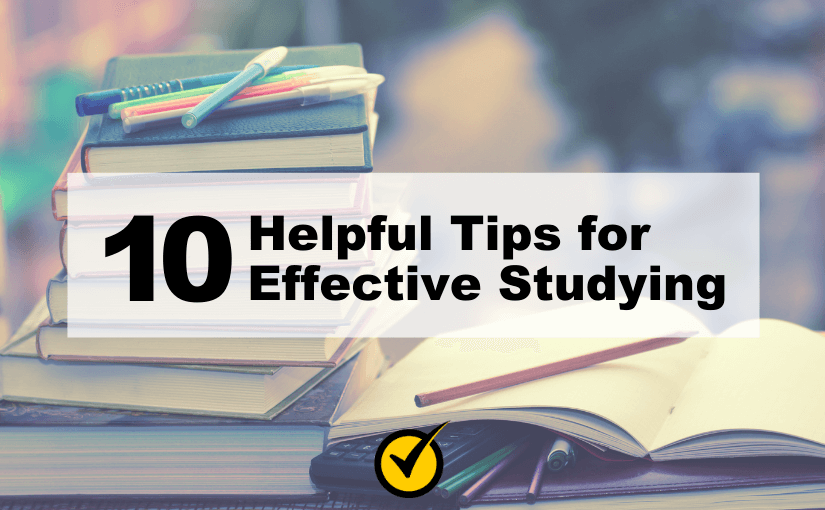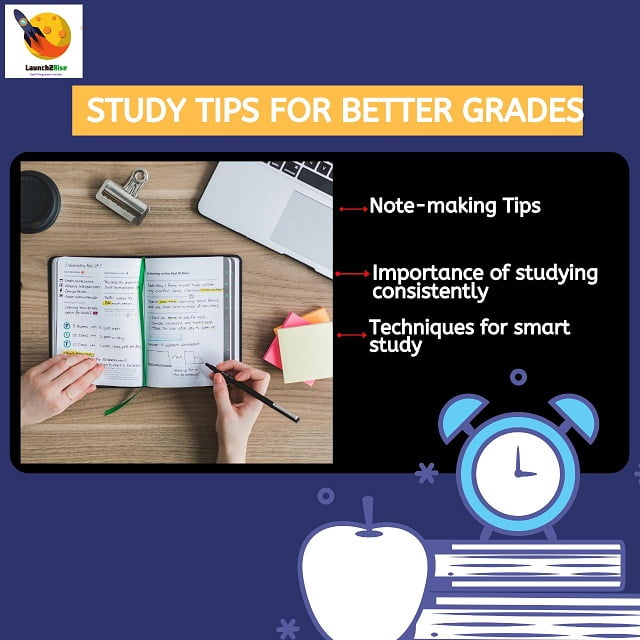Table of Contents

Best Study Tips
Final exams and big semester-end papers are among the most challenging aspects of the college experience. There is so much to learn, keep organized, and remember as you head into finals. Following effective study tips can help reduce stress and increase your grade point average.
Ther are few best study tips given below.
1. Don’t Cram!
It might be tempting to leave all your studying for that big exam up until the last minute, but research suggests that cramming does not improve longer term learning.
Students may perform well on a test for which they’ve crammed, but that doesn’t mean they’ve truly learned the material, says an article from the American Psychological Association. Instead of cramming, studies have shown that studying with the goal of long-term retention is best for learning overall.
2. GET ORGANISED
Taking the time to get organised will set you up well and help you achieve your learning goals.
Top study tips:
- Invest in a diary, and use it to keep track of current assignment deadlines.
- Bring all the material and devices you need to class, so you can participate. You may find it helpful to pack your bag the night before, so you’re ready to go first thing in the morning.
3. TAKE NOTES
To keep your brain engaged during class, take notes, which you can refer to later, as you refine your study techniques.
Notes can help store information in your long-term memory, right there in class. These notes will be important for reviewing when you’re completing assessments and assignments.
You might find it handy to condense your notes after class, so they’re clear and easy to read. Underline or highlight key points. If anything doesn’t make sense, you can seek clarification from your teacher.
You can also create visual aids like flow charts and mind maps to help simplify information. For some students, these visual aids help them remember complex information and study more effectively.
4. TALK TO YOUR TEACHER & ASK QUESTIONS
Your teacher is, in a way, a resource who is there to be used!
The VU Block Model allows you to focus on one subject at a time. Learning in a work-shop style class, you get the opportunity to know your teacher.
You can take advantage of this interactive learning environment by asking questions during or after class, where you can get fast feedback.
Teachers can further clarify any topics you find confusing. You may even be able to get a little direction on assignments before submitting.
Your teacher will no doubt be impressed with your initiative and happy to help.
5. SPACE OUT YOUR STUDYING
One of the most effective ways of studying is to space out your learning sessions.
If you break up your study load over several days, you’ll retain information far more readily than if you crammed in one long session.
This can help deeply ingrain information, allowing you to retain it for the long term.
You’ll find you achieve much better results for it.

6. CREATE A STUDY PLAN – & STICK TO IT
One top study tip is to create a schedule or plan.
This is incredibly helpful for time management and can help you reach your learning goals.
A study plan will:
- motivate you to study, as you’ll have time dedicated to learning
- keep you organised around work, hobbies and other commitments, as you can plan ahead
- break your study load into manageable blocks
- give you time to complete your assignments, ensuring they’re not rushed or last-minute.
7. Practice, practice, practice!
Musicians practice their instruments. Athletes practice sports skills. The same should go for learning.
“If you want to be able to remember information, the best thing you can do is practice,” says Katherine Rawson. She’s a psychologist at Kent State University in Ohio. In one 2013 study, students took practice tests over several weeks. On the final test, they scored more than a full letter grade better, on average, than did students who studied the way they normally had.
8. Focus on Understanding
Memorizing means finding ways to remember and repeat facts. Understanding goes a little deeper, and means you can apply new knowledge to various scenarios and know how it relates to other concepts. College exams often test understanding, not just memorization.
9. DON’T JUST RE-READ BUT STUDY
When you are reading and re-reading texts and notes, you’re not studying. This is because you’re not engaging with the material.
You’ll discover that you have trouble remembering class notes if you’re not using active studying techniques.
Instead of reading, try:
- creating concept maps and diagrams
- explaining concepts to yourself step by step
- formulating questions and problems that you can come back to and solve, effectively creating a quiz for yourself
- becoming a teacher or tutor to your study group or partner and learning the course material by explaining concepts to them.

Read more: Most Popular Mobile Apps
